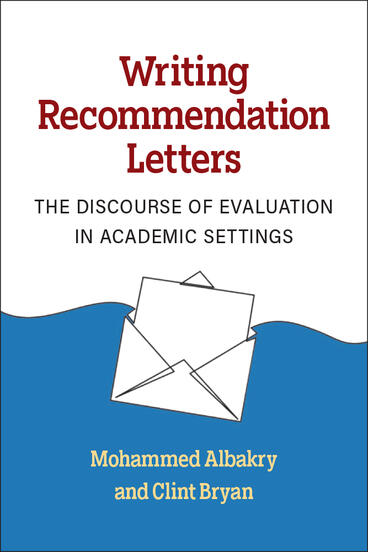Writing Recommendation Letters
The Discourse of Evaluation in Academic Settings
The first book-length guide to academic recommendation letters, supported by real-world examples
Description
Even though reading and writing recommendation letters is one of the essential service tasks of the professorial life of academics, there are few resources to train graduate students and junior academics on how to draft a successful recommendation letter for different academic purposes. Writing Recommendation Letters draws linguistic and rhetorical principles from close to a thousand real-world examples of academic letters of recommendation. As a result, the research that informs the pedagogy is extensive, current, and highly relevant to the discourse of evaluation in academic settings with findings that have implications for genre-based writing instruction, English for Academic Purposes (EAP), and teaching of academic literacies. The authors are two experienced college professors who regularly teach graduate students and mentor young academics, so the reflection questions and instructor suggestions they provide were designed for today’s university classroom. The result is an instructive book that translates academic discourse structures and principles into accessible language, supplying authentic examples and ample writing practice.
Key Features
- Readers will learn the theoretical context that defines the genre of letters of recommendation.
- The book highlights the similarities and differences between the three different types of letters of recommendation: letters written for graduate admission, letters written in support of fellowship applications, and letters written to support obtaining a faculty position.
- Chapters on different aspects of linguistic and rhetorical features discuss presenting the applicants' credentials, highlighting the strengths of their character, accentuating and downplaying certain traits, as well as the pros and cons of boilerplate language and the use of customary frames for opening and closing.
- Readers will see real-world examples of actual letters of recommendation to see how seasoned faculty build the case for the applicant.
Mohammed Albakry is Professor of English and Applied Linguistics at Middle Tennessee State University.
Clint Bryan is Associate Professor of English and Dean of College of Arts and Sciences at Northwest University.
Reviews
“This valuable book provides perceptive insight into the structure, content range, rhetorical norms, and recurring textual features that typify the academic-supporting genre of recommendation letters. It admirably addresses the needs and expectations of its specialized audience as well as the varied contexts for reading and writing reference letters by balancing extensive empirically based scholarship with welcome practical guidance and activities. Its clear and compelling structure and style will benefit faculty who have been reading and writing recommendation letters for years as well as those wishing to learn or to teach others to do so effectively.”
- Hans Gabriel, Michael and Amy Tiemann Distinguished Professor of the Division of Liberal Arts, University of North Carolina School of the Arts
“Albakry and Bryan’s Writing Recommendation Letters: The Discourse of Evaluation in Academic Settings is both a comprehensive analysis of academic letters of recommendation and useful handbook for the professional or faculty member who is asked to provide such a letter. It is an excellent source of practical advice in an area that is rarely taught.”
- Vincent Moore, Ph.D., Professor of English & Humanities, School of Creative & Media Arts, Tiffin University, Tiffin, OH

